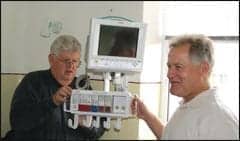 |
| L-R: David Harrington, PhD, and Sam Downing, CEO, Salinas Valley Memorial Healthcare System, Salinas, Calif, mount a monitor. |
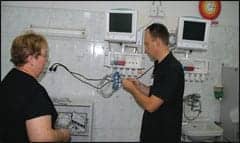 |
| L-R: Nurse Dottie Harrington and Ray Schmitt, Assist International, set up a Philips bedside monitor in the emergency room. |
During a biomedical mission trip to India in 1992, David Harrington, PhD, a health care consultant from Medway, Mass, heard the venerable Mother Theresa speak an inspiring phrase to him that he has never forgotten: “Helping others is the greatest thing a person can do with their life.” Harrington had traveled all the way to Kolkata (Calcutta) to assist local biomeds install and repair equipment in a hospital that cared for the city’s poor and neglected.
Missions abroad bring dedicated health care workers from all sectors together to assist those in less fortunate parts of the world achieve better standards of health care, one facility at a time. Every year, BMETs and clinical engineers routinely donate equipment, expertise, and time to installing and repairing medical equipment throughout the world.
It is in this spirit of helping others, inspired by Mother Theresa and health care missionaries everywhere, that Harrington and a team assembled by Assist International, Scotts Valley, Calif, ventured to the heart of Transylvania one Halloween to take part in a memorable install at a children’s hospital in Cluj, Romania. Harrington recalls his experiences installing some badly needed monitoring equipment. His story follows:
Like much of the world, the hospital was a mixture of old and new. The front part of the emergency room was open, airy, and as modern as most here in the US. However, going through the doors to the back of the ER was like stepping back 50 years.
We added monitors, connecting them to a central station so all the beds could be seen from a central point. While some of the crew worked on the ER, others worked on the surgical IC unit, located in another building.
Not uncommonly, the unit had no monitors and no central communication point. We also learned that the operating rooms did not have monitors, either. As the crew worked unpacking the equipment that was shipped, others prepared for the install. Still others pulled wires, drilled holes in the walls, and put up wall brackets to mount the monitors on.
We started on a Friday, worked some of Saturday, came back on Monday, and had the units up and running on Tuesday. We installed and wired a total of 18 monitors in that time frame while the units still had patients in them. Both Brad Carrott, senior administrative director of biomedical services, Salinas Valley Memorial Healthcare System, Salinas, Calif, and Joe Daco, a field service person from Philips, worked very hard to make sure things went well.
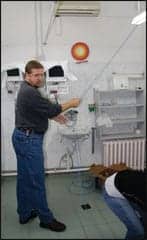 |
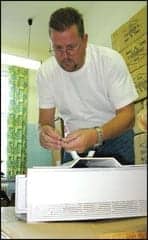 |
| Left: In Cluj, Romania, Brad Carrott pulling cables, which shows how high the rooms were. Right: On a mission trip to Hungary, Carrott works on a Philips system. | |
You could not ask for better people on an installation, and we all made sure that the local biomeds were very involved during the installation. The training staff also did a great job of preparing the nurses and physicians on the correct use of the monitors. At the end of the installation, everyone was comfortable that the equipment would both be properly used and maintained.
On the same trip, Harrington also decided to revisit a cardiac hospital in the same city, where he had volunteered in 1991, with his friend Bob Pagett, founder and president of Assist International:
The staff there was happy to see us and, strange as it may seem, one of the physicians still had a new corncob pipe I had presented to him on our last trip, when I was still smoking. There were several problems there that Brad and Joe helped correct before leaving Cluj early on Thursday morning. As we were walking back to the children’s hospital, Bob mentioned that Assist International has done over 80 projects in 45 countries and they could not have done any of them without the support and the on-site, hands-on efforts of the biomeds and clinical engineers. Bob estimated that some 40 BMETs and CEs have gone out with Assist over the years. If you combine that number with all the others who have traveled with other groups, it becomes a significant percentage of our very small profession.
While most experiences are overwhelmingly positive, mission work does not come without its pitfalls. During his many trips abroad, Carrott has braved everything from working on badly damaged equipment that has fallen out of an airplane to the sometimes very real danger of electric shock, and warns that mission work may not be for everyone. But for those willing to brave the dangers and the sometimes stressfully long days, the rewards—much like the memories made—will speak for themselves.
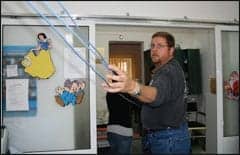 |
| In Cluj, Romania, Brad Carrott pulling cables. |
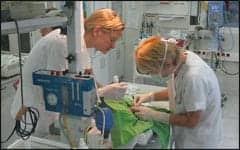 |
| On a previous trip to Hungary, nurses began working at a critical care bed immediately after it was installed. |
Like Harrington, Carrot has a similar passion for using his skills to make a difference. He has been assisting biomeds on missions abroad for decades, having traveled everywhere from Africa to Mongolia, always eager to tackle a new adventure. Carrott is full of stories, which have left him with not only enough friends and experiences to last a lifetime, but also with a new appreciation for his profession and the dedication of his fellow biomeds.
“The people we meet are very talented; they just don’t have the money or the resources we do,” Carrott says. “A lot of doctors in these countries trained in the United States or in France. When they return to their countries, they go from being able to see patients’ respirations, heart rates, and blood pressures to having to watch their skin color or the color of their lips.”
Lending a Hand
Generally, medical mission trips usually require a 2-week minimum commitment, and interested biomeds should be prepared to use their own personal time off and pay their own expenses, which are generally tax deductible. Above all, biomeds should come prepared to work, and Carrott makes no secret of the stress these trips can often bring. “These are long hours,” he says. “Because, when you’re done, everything has to be up and running, and it has to be done safely.”
Not surprisingly, biomeds with well-rounded technical skills and experience with a variety of equipment are often in high demand. The greatest asset on a mission trip, however, is most often a good communicator. In addition to repairing and installing equipment, biomeds on missions must also make sure that they are leaving the equipment in capable hands by teaching local biomeds how to make repairs and keep up the preventive maintenance.
The bottom line, according to Carrott, for any who still need convincing: “You will be making a difference. Lives will be saved because of the work you do.”
Stephen Noonoo is associate editor of 24×7. Contact him at .
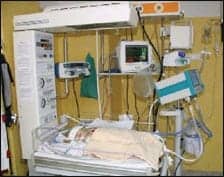 |
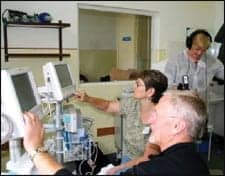 |
| An ICU in Cluj, Romania, receives its first infant warmer. | L-R: In Cluj, Romania, Dave Kasting, MD, and Sharon Roberts, RN, both of Salinas Valley Memorial Healthcare System, prepare their in-services for the medical staff at the hospital. In the background, PR representative for Salinas, Sue Marscel. |
Make a Difference
If you feel inspired to join a mission, explore the organizations below to find the one that is right for you.
American Medical Resource Foundation Inc
46 N Montello St
Brockton, MA 02301
(508) 580-3301
www.amrf.com
The American Medical Resources Foundation’s mission is to improve health care around the world by donating medical equipment and supplies to hospitals that serve the poor in underdeveloped and developing countries of the world. Donations of medical equipment are shipped to hospitals worldwide from its facility, and arrangements for engineering/technician training programs are made through this office.
Assist International
PO Box 66396
Scotts Valley, CA 95067
(831) 438-4582
www.assistinternational.org
Assist International builds the capacity of hospitals in developing countries to more effectively serve the people in their area. It provides medical equipment and training for physicians and nursing staff. Biomeds need to be familiar with the older equipment they refurbish and repair, usually not more than one generation old. Biomeds need skills in installations and training on cardiac care monitors, central stations, ultrasounds, and ventilators. ?
CardioStart International
6110 Hartford St
Tampa, FL 33619
(813) 740-2698
www.cardiostart.comJoanne McGuire, administrative director
CardioStart International aspires to provide greater hope and support to families with children and adults afflicted with heart disease. It provides free heart surgery and associated medical care to children and adults living in underserved regions of the world. The organization desires biomeds to accompany every mission it undertakes.
earthMed
106 Ardsley Rd
Upper Darby, PA 19082
(646) 508-0096
www.earthMed.orgLou Schonder, earthMed director and interim director of clinical engineering
earthMed is an independent, nonsectarian, nonpolitical organization that improves medical care in developing countries through medical program development, education, direct patient care, diagnostic support, medical device donations, medical supply donations, and community outreach support with the support of medical volunteers. Schonder emphasizes that a biomed’s practical know-how is a key consideration in the process of selecting biomeds for earthMed’s traveling medical teams.
Global Links
4809 Penn Ave, Second Floor
Pittsburgh, PA 15224
(412) 361-3424, ext 225
www.globallinks.org
Global Links is a medical relief and development organization dedicated to a two-fold mission of environmental stewardship and improving health in developing countries. It collaborates with US hospitals to redirect still useful materials away from landfills to public health improvement efforts in targeted countries throughout the hemisphere.
International Aid
17011 Hickory
Spring Lake, MI 49456
(800) 968-7490
www.internationalaid.org
Bill Teninty, director MET
Jim Loeffler
International Aid is a Christian relief and development agency that responds to Biblical mandates by providing and supporting solutions in health care. At the core of International Aid’s strengths is its commitment to worldwide medical missions.
International Children’s Heart Foundation
1750 Madison Ave #100
Memphis, TN 38104
(877) 869-4243
www.babyheart.org
International Children’s Heart Foundation brings the skills, technology, and knowledge to cure and care for children with congenital heart disease in developing countries. The organization operates mission trips to educate local health care professionals and provide needed equipment and medications. Twenty-nine trips are planned for 2009 throughout the developing world, with several additional trips in the planning stages.
MedEquip Missions, a ministry of Helps International Missions
573 Fairview Rd
Asheville, NC 28803
(828) 277-3812
www.medequip.org
Dennis McCutcheon, director
MedEquip Missions evaluates and repairs donated medical equipment. It also sends biomedical equipment technicians on short-term missions to meet the needs of active Christian hospitals.
Operation Renewed Hope
PO Box 43242
Fayetteville, NC 28309-3242
(910) 987-5072
www.operationrenewedhope.org
Dave Wayne
SE Medical Systems LLC
(770) 210-6693
Operation Renewed Hope provides the opportunity for individuals to serve God through short-term and long-term missions throughout the world. Team members travel on mission trips together, transporting equipment and supplies that bring relief.
ORBIS International
520 Eighth Ave, 11th Floor
New York, NY 10018
(646) 674-5511
www.orbis.org
Ismael Cordero, CBET, health care technology manager
ORBIS International is a nonprofit organization that strives to eliminate avoidable blindness and restore sight in the developing world. Biomeds may not need specialized knowledge of ophthalmic equipment to lend assistance on medical missions. ORBIS welcomes all inquiries. ?
PROJECT C.U.R.E.
10377 E Geddes Ave
Centennial, CO 80112
(303) 792-0729, ext 228
www.projectcure.org
Jean Feist, director C.U.R.E. Clinics
PROJECT C.U.R.E. is a humanitarian relief organization that collects donated medical supplies and equipment and gives them to the poorest in developing countries. Its clinics division provides an avenue for volunteer medical professionals to travel to developing countries and offer medical services. Medical teams are sent to sites following the container delivery of medical supplies and equipment, and this is repeated every 6 or 12 months. Training and information is provided to each team member about the medical conditions and equipment needs. Trips for 2009 and 2010 include: Tanzania, Ghana, Malawi, Madagascar, Peru, Guatemala, and Cote D’Ivoire.
Project Open Hearts
359 Pearl St
Denver, CO 80203
(303) 929-8850
www.poh.orgRita Lenz, executive director
Project Open Hearts is a nonprofit organization that works with foreign medical staff to provide firsthand cardiac surgical, cardiac nursing training, and assistance with cardiac diagnostic procedures. A biomed’s practical know-how is key when medical team members are being selected.
Samaritan’s Purse, World Medical Mission
PO Box 3000
Boone, NC 28607
(828) 262-1980
www.samaritanspurse.org
Jim Moore
World Medical Mission, the medical arm of Samaritan’s Purse, serves Christian hospitals and clinics in Africa, Asia, Europe, Latin America, and the Middle East by arranging short-term mission trips for health care personnel who volunteer for ministry overseas. They also provide and install critically needed equipment and supplies.



